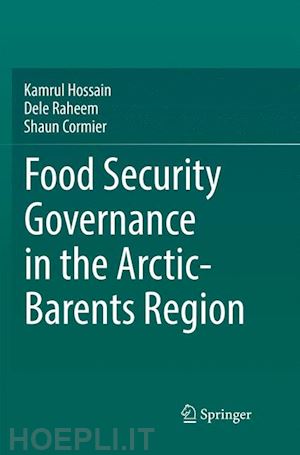
Questo prodotto usufruisce delle SPEDIZIONI GRATIS
selezionando l'opzione Corriere Veloce in fase di ordine.
Pagabile anche con Carta della cultura giovani e del merito, 18App Bonus Cultura e Carta del Docente
Food Security Governance in the Arctic-Barents Region provides a multidisciplinary perspective on the major food security and safety challenges faced in the Arctic region. The authors address existing gaps in current knowledge of the coordination and implementation of legal framework and policy that affects the Arctic. The volume is unique in its focus on the Barents region, an area of northern Europe containing Norway, Sweden, Finland and Russia. The region has a population of approximately 5.2 million, including indigenous and non-indigenous peoples. The authors offer a balanced and systemic review of the role of traditional foods in this region, along with an overview of the regulatory tools and institutions that govern food security.
Food security and safety in the –Arctic-Barents region is connected to and impacted by transformations from both inside and outside the area. Climate change, globalization and human activities affect the availability, accessibility, and affordability of food. The result of these transformations has an impact on the food security and safety for both indigenous and non-indigenous individuals and communities. The authors, by highlighting these challenges, reveal the importance of having harmonized policies and legal tools in place in order to strengthen food security and safety in the Barents region.The book forms part of the main outcome of the Academy of Finland’s ongoing project on Human Security as a promotional tool for societal security in the Arctic: Addressing Multiple Vulnerability to its Population with Specific Reference to the Barents Region (HuSArctic). Researchers, policy makers, and other stakeholders will find the book to be an important contribution to the promotion of policies and strategies on food security.
Dele Raheem is a Senior Researcher at the Northern Institute for Environmental and Minority Law (NIEM) in the Arctic Centre, University of Lapland, Rovaniemi. His doctoral degree in Food Sciences was from Food and Environmental Sciences department of the University of Helsinki, Finland. He has published in many peer- reviewed international journals in the fields of food microbiology, nutrition, food packaging and other related topics. His current research interest at NIEM is on crosscutting issues related to food and human security especially in the Arctic-Barents region.
Shaun Cormier obtained his Masters degree in Law from the University of Lapland, Rovaniemi. He worked as a Researcher at the Northern Institute of Environmental and Minority Law (NIEM) at the Arctic Centre of the University of Lapland. His thesis was on “Enhancing Indigenous Food Security in the Arctic: Through Law, Policy, and the Arctic Council.











Il sito utilizza cookie ed altri strumenti di tracciamento che raccolgono informazioni dal dispositivo dell’utente. Oltre ai cookie tecnici ed analitici aggregati, strettamente necessari per il funzionamento di questo sito web, previo consenso dell’utente possono essere installati cookie di profilazione e marketing e cookie dei social media. Cliccando su “Accetto tutti i cookie” saranno attivate tutte le categorie di cookie. Per accettare solo deterninate categorie di cookie, cliccare invece su “Impostazioni cookie”. Chiudendo il banner o continuando a navigare saranno installati solo cookie tecnici. Per maggiori dettagli, consultare la Cookie Policy.